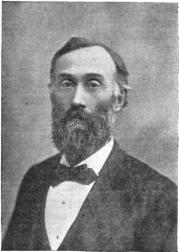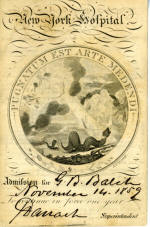Galusha
B. Balch, M.D.


|
Balch, Galusha B. |
Graduated Columbia 1860 |
98th Reg NY Vol Inf.
2nd Vet Cav NYV |
Asst. Surg Oct. 1861-Sept.
1862
Asst. Surg Jan. 1864-Nov. 1865 |
Galusha Burchard Balch, son of
Alvah Burchard and Mary [McArthur] Balch, was born February 6, 1839, at
Plattsburgh, N. Y.
Galusha B. was born and reared
upon the farm on which his grandfather located in 1800. He finished
his schooling at the Plattsburgh Academy, and after teaching
district schools for two sesisons entered the Berkshire Medical
College at Pittsfield, Massachusetts. Here he was under the tutilage
of Dr. Harry Childs and his son, Dr. Timothy Childs. He then
finished his medical education at the College of Physicians and
Surgeons of the Medical Department of Columbia College at New York
City, and graduated in 1860. After graduating he practiced first at
Saranac, and then at North Lawrence, New York. At the outbreak of
the Civil War he passed the examination of the board of examiners
for medical staff appointments in New York regiments, and was
commissioned assistant surgeon of the 98th New York Infantry,
October 20, 1861. The regiment was at that time being recruited at
Malone, N. Y.
In the spring of 1862 he went to
the front with this regiment. It was assigned to the Army of the
Potomac, and went to the Peninsula under General McClellan. Upon the
taking of Yorktown he was detached from his regiment and assigned to
duty in the general hospital there, and for a time was in charge of
the steamer State of Maine, transporting sick to Baltimore. While
thus engaged Dr. J. Simpson, the medical director at Baltimore, said
in a letter to the Surgeon General that the condition in which the
State of Maine arrived was highly creditable to Dr. Balch, that the
sick were well cared for and that the sanitary condition of the
vessel was in a much better state than that of the others that had
lately arrived.
Contracting typho-malarial fever
at Yorktown, he lay sick in hospital for about six weeks. Having
returned to lus regiment early in August before he had fully
recovered, the condition of his health led him to resign on Sept.
20, 1862. Returning north he located, as soon as his health would
permit, at Sheffield, Massachusetts, and practiced his profession
till December, 1863, when, feeling restored to health, he accepted a
commission as Assistant Surgeon of the Second Regiment of Veteran
Cavalry, New York Volunteers. With this regiment he went to the
Department of the Gulf in February, 1864, and was the only surgeon
with the regiment during the lied River campaign of that year, and
with it in the battles of Alexandria, Grand Eccre, Camptee, Pleasant
Hill, Cane River and Yellow Bayou.
During the summer of 1864, and
winter following, the regiment was stationed at Morganzia Bend on
the Mississippi river, and was kept constantly scouting up and down
both sides of the river between Baton Rouge and the mouth of the Red
river, having frequent sanguinary skirmishes. The Doctor was almost
always out with these scouting parties, and consequently was
frequently exposed to the bullets of the enemy.
In March, 1865, the regiment was
sent to Pensicola, Fla., and joined General Steel, who moved
around into the rear of Mobile, Ala., to co-operate with General
Canby in capturing that city. After the surrender of Fort Blakely
the regiment moved out through the state of Alabama, and on April
11, fought the battle at Mt. Pleasant, one of the last of the war.
After the surrender of all the opposing forces the regiment was sent
to Talladega, Alabama, where it remained until it was mustered out
on November 8, 1865.
In the spring of 1866 the Doctor
located at Plattsburgh, N. Y., and purchased a drug store. This was
destroyed by the great fire of Plattsburgh, in 1868. In 1872 he
moved to Yonkers, N. Y., where he is now practicing his profession.
In 1876 he was appointed Health Officer for the city and organized
the Health Department and made it one of the best in the state at
that time. This office he held two years.
In 1877 he was elected
vice-president of the Westchester County Medical Society, and, in
the year following, was chosen as its president and is still a
member of that society.
Additional information from
another source:
He attended Plattsbnrg
Academy, taught school himself, and in the meantime began the
study of medicine under Dr. L. F. Bid well. His medical studies
were continued at the Berkshire Medical College under the
instruction of the two Childs, father and son, and later at the
College of Physicians and Surgeons, Columbia College, N. Y.,
whence lie graduated in 1860. Saranac, N. Y. was the chosen Held
of the young physician but as his practice there was
insufficient for his ambition he removed to North Lawrence, N.
Y., where he was at the outbreak of the Civil war. On the 9th of
Oct., 1866 he had married Harriet Cornelia daughter of Truman
Bishop and Mary Ann (Austin) Andrews, of Richmond, Mass., who,
however, was born at Addison in New York. Dr. Balch was
commissioned Assistant Surgeon of the 98th N. Y. Vol. Inf., 24th
Oct., 1861 and with his regiment joined the army of the Potomac
under McClellan. Afterthe taking of Yorktown he was assigned to
special hospital service and his name will be recalled with
gratitude by many Union soldiers who came under his charge
during the period he had charge of the S. S. State of Maine,
conveying the sick to Baltimore.
Having contracted
typhoid-malaria fever he resigned and retired to Sheffield,
Mass., to recruit his health and establish a practice, but in
Dec., 1863 he again accepted a commission as Asst. Surgeon this
time in the 2dN. Y. Veteran Cavalry and was soon in active
service in the Red River campaign. In 1864 he was always at the
front with the regiment being the only surgeon in the command,
and, on account of the perilous duty the regiment was called
upon to perform, frequently exposed to death by bullet. At one
time his health was so shattered, he was unable to mount his
horse unaided. He was with the regiment until mustered out, 8
Nov., 1865, having during the last year or the war served in
Florida, and Alabama.
Col. M. H. Chysler, the
commander of the regiment paid the Doctor deserved tribute in a
letter written in 1880 and in which he says "you never shrank
from danger; you were a fearless and efficient officer.
Source: Google digital books
Return to page 9 of Lecture Tickets
|